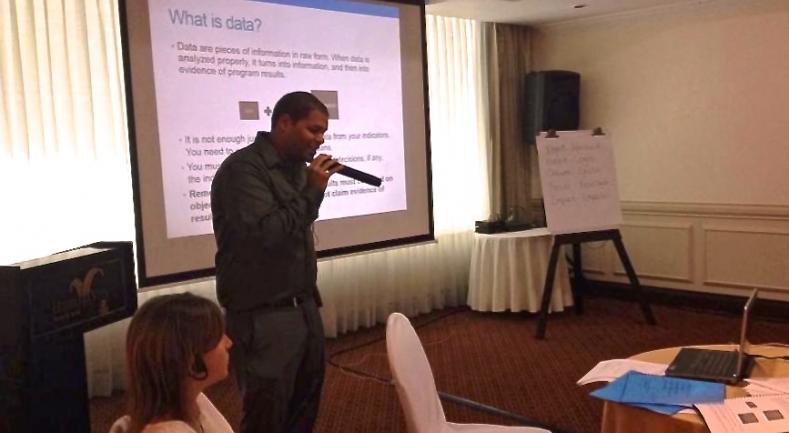Skills Courses

The Conflict Resolution Program offers weekend-intensive skills courses. These courses focus on a single skill set or subject and are taught by top practitioners in the field.
The conflict resolution program requires students to take a minimum of one skills course. Students can also take a bundle of three one-credit skills courses over the course of their studies in place of an elective. These courses are optimal for working students, as many are offered on weekends and for students seeking practical experience for career development.
Spring 2020 Skills Courses
In the spring of 2020, we are offering:
Facilitation
Counter-Crisis Communications
Navigating Confrontation
Cybersecurity and Conflict
Policy Briefing
Fall 2020 Skills Courses
In the fall of 2020, we are offering:
Facilitation II
Social Entrepreneurship & Social Change
Project Design
Skills for Fieldwork
Practical Routes to Resolving Conflict: The Middle East
Recent Skills Courses
In the academic year 2019/2020, the CR program offered the following skills courses:
Counter-Crisis Communications
Instructor: Brett Bruen, President, Global Situation Room, Inc. & former Director of Global Engagement at the White House.
Risk has gone regular. Governments and organizations now find themselves often overwhelmed by the seemingly constant onslaught of threats, turbulence, and tumult. This state of near-constant crisis requires a rethinking of traditional communications strategies. The traditional tactics tell you to batten down the hatches and ride out the storm. The Obama White House began to experiment with a more proactive form of crisis communications. First deployed against Russian propaganda in Ukraine, it proved successful in retaking the initiative and reframing the conversation. The class will explore how governments and organizations can more effectively identify and track their vulnerabilities. Students will have an opportunity to work on the development of crisis communications infrastructure and countermeasures that can be applied to current and future work. There are also a number of high-level leaders who share their experiences managing and covering crises. Past speakers include the Deputy Secretary of State, President Macron’s spokesperson, and President Obama’s personal assistant.
Cybersecurity and Conflict
Instructor: Boyden Rohner
Deputy Director for Operations, National Cybersecurity and Communications Integration Center
This course explores the impact of information technology on conflict.
Food Security and Conflict
Instructor: Elisabeth Kvitashvili
Accomplished development professional with global humanitarian and crisis response leadership and field operations expertise spanning more than 30 years with USAID in countries such as the Caucasus, Afghanistan, Iraq, and the Horn of Africa.
This course is an examination of the dynamics of food security, humanitarian assistance, and the assessment of aid programs in settings of war, conflict, and hunger.
Navigating Confrontation
Instructor: Joe Weston
Facilitator, consultant, coach, and peace advocate. Author, Mastering Respectful Confrontation.
The course consists of learning basic knowledge of neuroscience, as well as exploring practical somatic exercises to learn self-regulation and manage stress levels. Ideal for people in high-stress jobs and those in leadership positions, these tools offer strategies and practices to be more effective with less time and effort.
Policy Briefing
Instructor: Patrick Quick
Department of State, Policy Planning, lead advisor for fragile states, conflict, and stabilization, and foreign assistance
Whether you are in the U.S. government, NGO community, or private sector, delivering succinct oral briefings to policymakers or senior leaders is an essential part of any career. Through a mix of instructor presentations and simulations, students will gain skills in (1) constructing appropriate content for briefings; (2) tailoring briefing content for specific target audiences; (3) synthesizing information into concise presentations; (4) key presentation skills; and (5) constructing and delivering briefings under tight timelines.
Routes to Resolve Conflict in the Middle East
Instructor: Mara Rudman
This course is a simulation exercise, focused on the role of practical institution-building work/efforts between Israelis, Palestinians, and international actors in public and private sectors across key areas that affect people’s lives such as — water, energy, and related economic development. Participating students may gain a perspective on the impact of resolving, mitigating, or exacerbating conflict that such work may have, depending on how it is handled. This dynamic should be applicable to other conflict situations. Everyone will have an assigned role – the instructor will make the assignments at the beginning of the first session. Students will be provided with sufficient background material, an opportunity to absorb it, and briefing in class, to step into roles in real time. Students will be expected to turn in a brief memo (3-4 pages double-spaced), in the voice of assigned roles, as a follow-up to the exercise.
Senior Vice President for Policy/Projects at Business Executives for National Security. She concurrently runs Quorum Strategies, a geopolitical strategy firm providing operations and management, private-public partnerships, policy, and strategic advising.
Skills for Fieldwork
Instructor: Julie Steiger
Director of Program Operations, Syria Response, Save the Children
This course is an introduction to fieldwork in difficult conditions.
Social Entrepreneurship for Social Change
Instructor: Craig Zelizer, Founder and CEO of Peace and Collaborative Development Network
Over the past two decades, the field of social entrepreneurship has increasingly grown in scope and impact. This highly practical and interactive skills course will provide students with the core skills and knowledge to understand and implement market-based solutions to addressing complex social challenges. The course will explore how business-based approaches are being integrated with social change and ethical approaches to facilitating change.
Students will explore the field of social entrepreneurship, the challenges and opportunities, and the relevance of the complex social, economic and political issues in the 21st century. A core part of the course will be students developing a concept for a potential social enterprise initiative, from nuts to bolts including need, context, mapping the existing gaps, competition, a clear revenue plan, etc.
Students will complete the course with a clear understanding of social entrepreneurship, a wealth of tools, skills, and resources to advance their work in this area, and the ability to navigate the ecosystem.
Government Master’s Program Office
Georgetown University
Box #571444
Car Barn, Suite 110
3520 Prospect Street, N.W.
Washington, DC 20057
conflictresolution@georgetown.edu | Phone: 202-687-6373 | Fax: 202-687-1112
